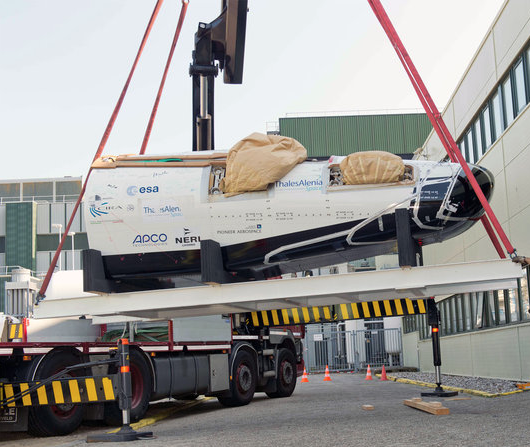[SatNews] On its first launch of the year, Europe’s Vega rocket will loft ESA’s unmanned spaceplane to test reentry technologies for future vehicles. The launch campaign has resumed, aiming for a liftoff on February 11, from Kourou, French Guiana to release ESA’s Intermediate eXperimental Vehicle, IXV, into a suborbital trajectory.
This mission will provide vital flight data for Europe to forge ahead in developing systems and advanced technologies for transportation systems of the future.

IXV Drop-test model being moved on September 24, 2014. This replica was built to be dropped from a helicopter and parachuted into the Mediterranean, to ensure the flight model would survive splashdown at the end of its plunge from space.
On October 23, the decision to postpone the launch was taken by the launch authorities as a result of safety concerns that required additional analysis. Finding an alternative trajectory solved the issue.
“Launch preparations have resumed,” said Jose-Maria Gallego Sanz, ESA’s IXV launch campaign manager. “Batteries that were removed from IXV are being taken from cold storage, charged and reinstalled. No additional tests are needed—IXV is ready to fly.”
The mission will last 100 minutes from liftoff to splashdown. Weighing around two tonnes and the size of a car, IXV is a snug fit inside Vega’s protective fairing. The two-piece shell will open to release the spaceplane at an altitude of 320 km.
IXV will coast to up to 420 km and then begin its reentry phase, recording a vast amount of data from a large number of conventional and advanced sensors.
The entry speed of 7.5 km/s at an altitude of 120 km will create the same conditions as those for a vehicle returning from low orbit. IXV will glide through the atmosphere at hypersonic speeds to test new European reentry technologies before parachutes deploy to slow the descent for a safe splashdown in the Pacific Ocean.
The Nos Aries recovery vessel is now stationed in Flamenco Island Anchorage in Panama. Over the last month, the crew has been testing the equipment for hoisting IXV out of the water.
ESA’s recovery team will board on January 25 for the ship to set sail on the last leg of its journey to the recovery spot.

